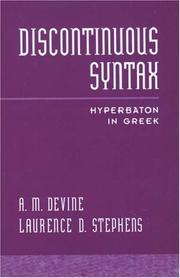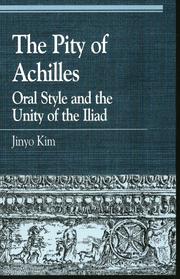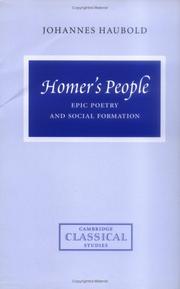| Listing 1 - 3 of 3 |
Sort by
|

ISBN: 019513270X 0195344006 1280530715 1429400552 9781429400558 9780195344004 9780195132700 9781280530715 0197704506 Year: 2000 Publisher: New York Oxford University Press
Abstract | Keywords | Export | Availability | Bookmark
 Loading...
Loading...Choose an application
- Reference Manager
- EndNote
- RefWorks (Direct export to RefWorks)
The interface between syntax and meaning, both semantic and pragmatic, has emerged as an area of linguistics theory. This study applies some of these ideas to hyperbaton, offering a new theory with broad applications for our understanding of Greek syntax.
Greek language --- Oral-formulaic analysis --- Rhetoric, Ancient --- Word order --- Syntax --- Homer --- Language --- Oral-formulaic analysis. --- Rhetoric, Ancient. --- Syntax. --- Word order. --- Ancient rhetoric --- Classical languages --- Greek rhetoric --- Latin language --- Latin rhetoric --- Formulaic analysis, Oral --- Folk literature --- Folklore --- Oral tradition --- Indo-European languages --- Classical philology --- Greek philology --- Rhetoric --- History and criticism --- Methodology --- Homeros --- Homère --- Language. --- Homerus --- Hóiméar --- Hūmīrūs --- Gomer --- Omir --- Omer --- Omero --- Ho-ma --- Homa --- Homérosz --- האמער --- הומירוס --- הומר --- הומרוס --- هومر --- هوميروس --- 荷马 --- Ὅμηρος --- Гамэр --- Hamėr --- Омир --- Homero --- 호메로스 --- Homerosŭ --- Homērs --- Homeras --- Хомер --- ホメーロス --- ホメロス --- Гомер --- Homeri --- Hema --- Pseudo-Homer --- Pseudo Omero --- Greek language - Word order --- Greek language - Syntax --- Homer - Language

ISBN: 0847686205 0847686213 9780847686216 9780847686209 Year: 2000 Publisher: Lanham: Rowman & Littlefield,
Abstract | Keywords | Export | Availability | Bookmark
 Loading...
Loading...Choose an application
- Reference Manager
- EndNote
- RefWorks (Direct export to RefWorks)
Epic poetry, Greek --- Achilles (Greek mythology) in literature --- Trojan War --- Oral tradition --- Oral-formulaic analysis --- Rhetoric, Ancient --- History and criticism --- Literature and the war --- Homer. --- Homer --- Technique --- Achilles (Greek mythology) in literature. --- Oral-formulaic analysis. --- Rhetoric, Ancient. --- History and criticism. --- Literature and the war. --- Ancient rhetoric --- Classical languages --- Greek language --- Greek rhetoric --- Latin language --- Latin rhetoric --- Formulaic analysis, Oral --- Folk literature --- Folklore --- Rhetoric --- Methodology --- Homeros --- Homère --- Technique. --- Homerus --- Hóiméar --- Hūmīrūs --- Gomer --- Omir --- Omer --- Omero --- Ho-ma --- Homa --- Homérosz --- האמער --- הומירוס --- הומר --- הומרוס --- هومر --- هوميروس --- 荷马 --- Ὅμηρος --- Гамэр --- Hamėr --- Омир --- Homero --- 호메로스 --- Homerosŭ --- Homērs --- Homeras --- Хомер --- ホメーロス --- ホメロス --- Гомер --- Homeri --- Hema --- Pseudo-Homer --- Pseudo Omero --- Epic poetry, Greek - History and criticism --- Trojan War - Literature and the war --- Oral tradition - Greece --- Homer - Iliad --- Homer - Technique

ISBN: 0511407610 1107297974 0511408382 0511409192 0511409710 0511410255 9780511410253 9781107297975 9780521770095 0521770092 9780521066419 0521066417 0511406495 Year: 2000 Publisher: Cambridge, UK New York, NY, USA
Abstract | Keywords | Export | Availability | Bookmark
 Loading...
Loading...Choose an application
- Reference Manager
- EndNote
- RefWorks (Direct export to RefWorks)
This book examines the role and character of Homer's people, laoi, in Homeric story-telling, arguing that Homeric poetry is crucially concerned with the people as a basis for communal life. Both The Iliad and The Odyssey are read as sustained meditations on the processes involved in protecting and destroying the people. The investigation draws on a wide range of approaches from formulaic analysis to the study of early performance contexts. From a close reading of the Homeric epics, Homer's people emerge as a community without effective social structures. When this is viewed from the perspective of Homeric performances in the polis, a contrast between Homer's laoi and the founding people of ritual emerges. While the former typically perish, the survival of the latter is secured by the establishment of successful institutions.
Epic poetry, Greek --- Politics and literature --- Literature and society --- Social structure in literature. --- Community life in literature. --- Oral-formulaic analysis. --- Formulaic analysis, Oral --- Folk literature --- Folklore --- Oral tradition --- History and criticism. --- History and criticism --- Methodology --- Homer --- Hóiméar --- Hūmīrūs --- Homeros --- Gomer --- Omir --- Omer --- Omero --- Ho-ma --- Homa --- Homérosz --- האמער --- הומירוס --- הומר --- הומרוס --- هومر --- هوميروس --- 荷马 --- Ὅμηρος --- Гамэр --- Hamėr --- Омир --- Homère --- Homero --- 호메로스 --- Homerosŭ --- Homērs --- Homeras --- Хомер --- ホメーロス --- ホメロス --- Гомер --- Homeri --- Hema --- Pseudo-Homer --- Pseudo Omero --- Political and social views. --- Social structure in literature --- Community life in literature --- Oral-formulaic analysis --- Poésie épique grecque --- Politique et littérature --- Littérature et société --- Structure sociale dans la littérature --- Communauté dans la littérature --- Analyse des formules orales --- History --- Histoire et critique --- Histoire --- Epic poetry, Greek - History and criticism. --- Politics and literature - Greece. --- Literature and society - Greece. --- Homerus
| Listing 1 - 3 of 3 |
Sort by
|

 Search
Search Feedback
Feedback About UniCat
About UniCat  Help
Help News
News